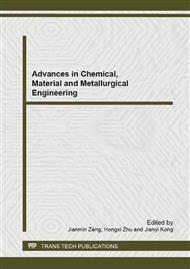[1]
P. Ballestra, J. L.Cuq: Influence of Pressurized Carbon Dioxide on the Thermal Inactivation of Bacterial and Fungal Spores", Lebensmittel- Wissenschaft und-Technologie, 31, 84-88 (1998).
DOI: 10.1006/fstl.1997.0299
Google Scholar
[2]
P. Ballestra, A. A. D. Silva and J. L.Cuq: "Inactivation of Escherichia coli by carbon dioxide under pressure", J. Food Sci, 61, 829-831 (1996).
DOI: 10.1111/j.1365-2621.1996.tb12212.x
Google Scholar
[3]
S. I. Hong, Y. R.,Pyun: "Membrane damage and enzyme inactivation of L. plantarum by high pressure CO2 treatment", International J. Food Microbiol., 63, 19-28(2001).
DOI: 10.1016/s0168-1605(00)00393-7
Google Scholar
[4]
M. Shimoda, Y.Yamamoto, J. Cocunubo-Castellanos, H.Tonoike, T. Kawano and H., Ishikawa:"Antimicrobial effects of pressured carbon dioxide in a continuous flow system", J. Food Sci., 63, 709-712 (1998).
DOI: 10.1111/j.1365-2621.1998.tb15819.x
Google Scholar
[5]
H.Corwin, T. H. Shellhammer: "Combined carbon dioxide and high pressure inactivation of pectin methylesterase, polyphenol oxidase Lactobacillus plantarum and E. coli", J. Food Sci., 67,697-701(2002).
DOI: 10.1111/j.1365-2621.2002.tb10661.x
Google Scholar
[6]
O. Erkmen, H. Karaman: "Kinetic studies on the high pressure carbon dioxide inactivation of Salmonella typhimuriun", J. Food Engineering, 50, 25-28. (2001).
DOI: 10.1016/s0260-8774(00)00191-6
Google Scholar
[7]
S. I.Park, J. I. Lee and J. Park: " Effects of a combined process of high pressure carbon dioxide and high hydrostatic pressure on the quality of carrot juice", J. Food Sci., 67, 1827-1834 (2002).
DOI: 10.1111/j.1365-2621.2002.tb08730.x
Google Scholar
[8]
M. Shimoda, J. Cocunubo-Castellanos, H. Kago, M. Miyake, Y.Osajima and I. Hayakawa: "The influence of dissolved CO2 concentration on the death kinetics of Saccharomyces cerevisiae", Appl Microbiol., 91, 306-311(2001).
DOI: 10.1046/j.1365-2672.2001.01386.x
Google Scholar
[9]
F. Gui, J. Wu, F. Chen, Z. Wang, X. Liao and X. Hu: "Inactivation of polyphenol oxidases in cloudy apple juice exposed to supercritical carbon dioxide",Food chem.,100, 678-1685(2007).
DOI: 10.1016/j.foodchem.2005.12.048
Google Scholar
[10]
L. Vamos-Vigyazo:"Polyphenol oxidase and peroxidase in fruits and vegetables", CRC Crit Rev Food Sci Nutr., 15, 49-127 (1981).
Google Scholar
[11]
P. Strübi, F. Escher and H. Neukom:"Neuere Arbeitenü ber die Technologie der Apfelnektar Herstellung", Industrie Obst-Gemuseverwert., 60, 349-351 (1975).
Google Scholar
[12]
J. M. Aquilera, K. Oppermann and F. Sanchez:" Kinetics of browning of Sultana grapes", J. Food Sci., 52, 990-993,1025 (1987).
DOI: 10.1111/j.1365-2621.1987.tb14258.x
Google Scholar
[13]
J. R. Heil, M. J. McCarthy and R. L., Merson: "Influence of gluconic acid on enzyme inactivation and color retention in canned apricots and peaches", J.Food Sci., 53, 1717-1719(1988)
DOI: 10.1111/j.1365-2621.1988.tb07824.x
Google Scholar
[14]
Y. J. O. Ansah: "Polyphenol oxidase in wild rice (Zizania palustris)", J. Agric. Food. Chem., 90,1-904 (1989).
DOI: 10.1021/jf00088a015
Google Scholar
[15]
A. Askar, F. A. El-Ashwah, H. T. Omran and A. A. S. Labib: "Color stability of Tropical nectars and a simple method and its determination", Fruit Processing., 1, 14-20 (1994).
Google Scholar
[16]
E. Koch, B. M. Meier, H. G.Eiben and A.Slusarenko: "A lipoxygenase from leaves of tomato (Lycopersicum esculentum Mill.) is induced in response to plant pathogenic pseudomonads", Plant Physilogy., 99,571-576 (1992).
DOI: 10.1104/pp.99.2.571
Google Scholar
[17]
S. Basak, H. S. Ramaswamy:"Ultra high pressure treatment of orange juice a kinetic study on inactivation of pectin methyl esterase", Food Research International., 29,601-607(1996)
DOI: 10.1016/s0963-9969(96)00068-3
Google Scholar
[18]
M. O. Balaban, A. G. Arreola, M, Marshall, A. Peplow, C. I. Wei and J. Cornell:"Inactivation of pectinesterase in orange juice by supercritical carbon dioxide", J. Food Sci., 56, 743-746 (1991).
DOI: 10.1111/j.1365-2621.1991.tb05372.x
Google Scholar
[19]
C. A. Weemaes, L. R. Ludikhuyze, I. V. D. Broeck, M. E. Hendrickx and P. P. Tobback:"Activity, electrophoretic characteristics and heat inactivation of polyphenoloxidases from apples, avocados, grapes, pears and plums", Lebensmittel-Wissenschaft und –Technologie., 31, 44-49 (1998a).
DOI: 10.1006/fstl.1997.0302
Google Scholar
[20]
C.Weemaes, L. Ludikhuyze and I. V. D: Broeck and M., Hendrickx:"High pressure inactivation of polyphenoloxidases", J. Food Sci., 63(5), 873-877 (1998b).
DOI: 10.1111/j.1365-2621.1998.tb17917.x
Google Scholar
[21]
C. A. Weemaes, L. R. Ludikhuyze, I. V. D. Broeck and M. E. Hendrickx:"Kinetics of combined pressure–temperature inactivation of avocado polyphenoloxidase", Biotechnol. Bioprocess Eng., 60(3), 292-300 (1998c).
DOI: 10.1002/(sici)1097-0290(19981105)60:3<292::aid-bit4>3.0.co;2-c
Google Scholar
[22]
K. P. Dimick, J. D. Ponting and B. Makower: "Heat inactivation of polyphenolase in fruit purees",Food Technology., 6, 237-241 (1951).
Google Scholar
[23]
J. L. Silva, G.Weber: "Pressure stability of proteins", Annu. Rev. Phys. Chem., 44, 89-113 (1993).
Google Scholar
[24]
X. Liu, Y. Gao, X. Peng ,B.Yang, H. Xu and J. Zhao; "Inactivation of peroxidase and polyphenol oxidase in red beet (Beta vugaris L.) extract with high pressure carbon dioxide", Innovat Food Sci Emerg Tech., 9 (1), 24-31 (2008).
DOI: 10.1016/j.ifset.2007.04.010
Google Scholar


